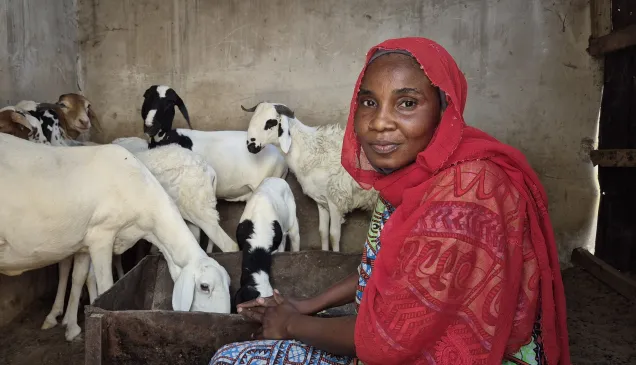“The Man from Egypt”: Why I left the comfort of the operating room to work in conflict zones
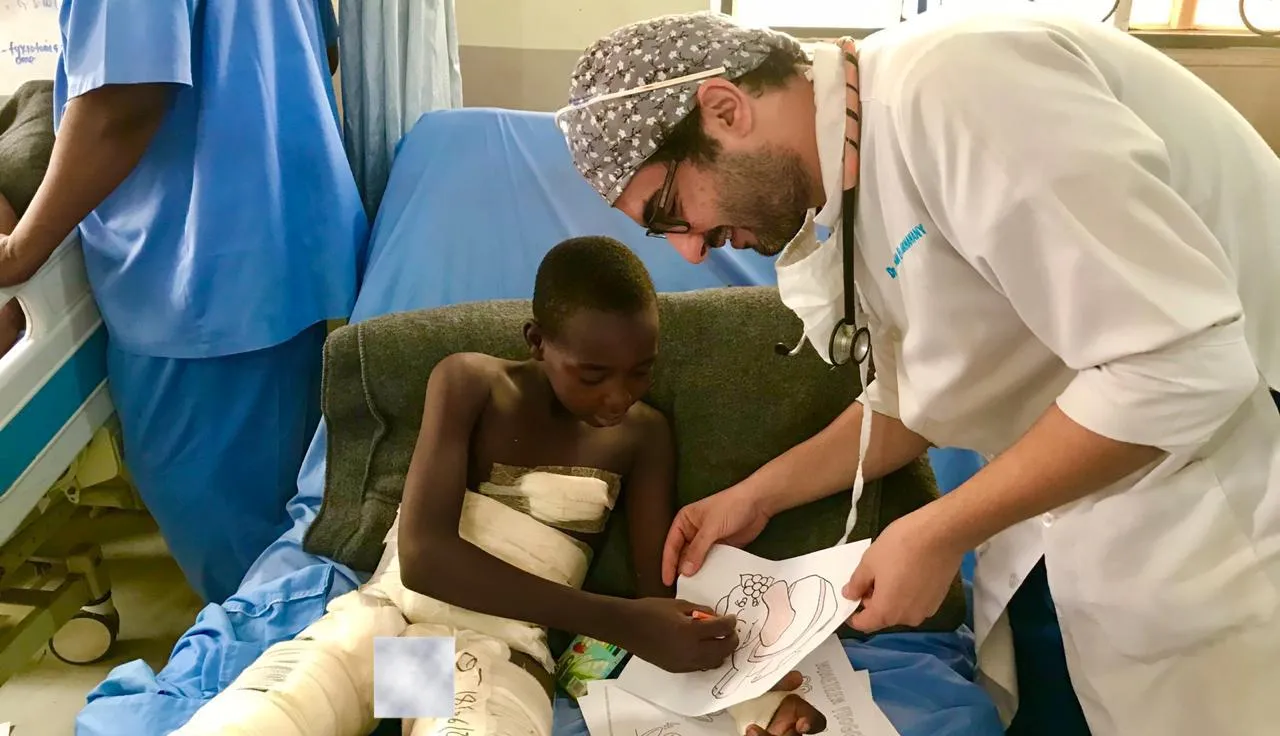
From the operating rooms where life battles death, Egyptian anesthesiologist Dr. Aktham Al-Farnawani recounts his journey from advanced hospitals to those functioning in tents amid crises. In his testimony, "The Man from Egypt," as he is called in Sudan, holds on to a single human thread that weaves through tents, roads, checkpoints, and operating rooms: to be fully present for each injured person and strive to do the best for the greatest number - even when few tools are at hand.
I have worked as an anesthesiologist in the humanitarian sector for over seven years now. Before that, I spent nearly thirteen years in well-equipped, advanced hospitals in both Egypt and Kuwait. There, I was trained to provide the highest standard of care, surrounded by technology and medical protocols, able to anticipate what would happen next. Life in that context is organized and safe. However, over the years, I found myself increasingly drawn to the stories of humanitarian organizations; I followed their work from afar, read their reports, and watched news clips, wondering about the people behind those brief headlines. It felt as if a harsh, fragile, and invisible world was demanding our attention and knocking on the door of our human conscience.
When I applied to join the International Committee of the Red Cross (ICRC), I knew I was stepping into the unknown. Leaving a stable career, colleagues, and family was not an easy decision. I still remember the difficulty I had in explaining this choice to friends and relatives. Some expressed pride, but most were skeptical or confused:
Why leave the security I had built? Why replace certainty with uncertainty? I asked myself the same questions more than once.
My first mission took me to South Sudan, accompanied by a few brief memos and organizational documents. I had no idea what awaited me. As soon as the plane landed, the reality revealed itself. The airport was a simple tent; luggage was piled outside, without a conveyor belt, without air conditioning, without order. The heat was suffocating. I felt weak and almost lost in this new environment. I wondered, "What have I done? Is there a way back to my old life?"
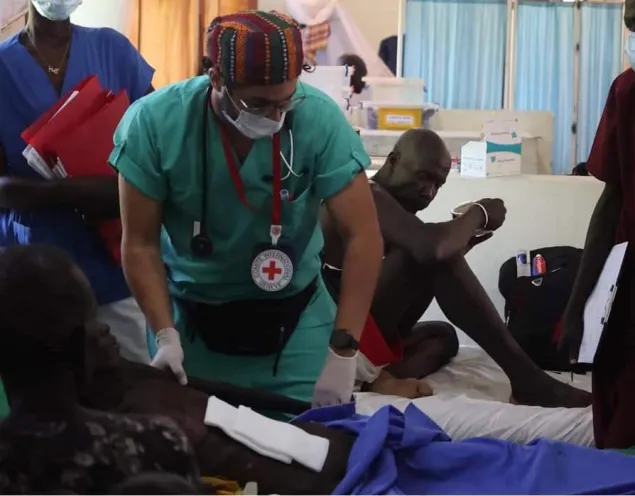
The greatest shock came in the hospital. The smell of the wards, the sight of malnourished children and adults, the horrific wounds - all left me speechless. I tried to conceal my fear from my family back home, repeating that everything was fine. But anxiety and confusion filled me.
Life in the field was governed by strange rules: Don’t put your shoes on without checking inside; you might find a scorpion. Don’t enter the toilet without a headlamp; you could find a snake sheltering from the rain. Those were the tips from my surgical colleague in the early days, who remains one of my closest friends.
At first, I felt like an outsider to the team and the community. But small moments gradually changed me. I learned a few words of the local language. My patients laughed when I repeated them, and they nicknamed me "The Man from Egypt”. Laughter began to transform into a human bond.
I realized that my patients, like me, were far from their families, vulnerable and alone among strangers. In this shared vulnerability, I found purpose. We became a family to each other, and this bond gave me the strength to persevere.
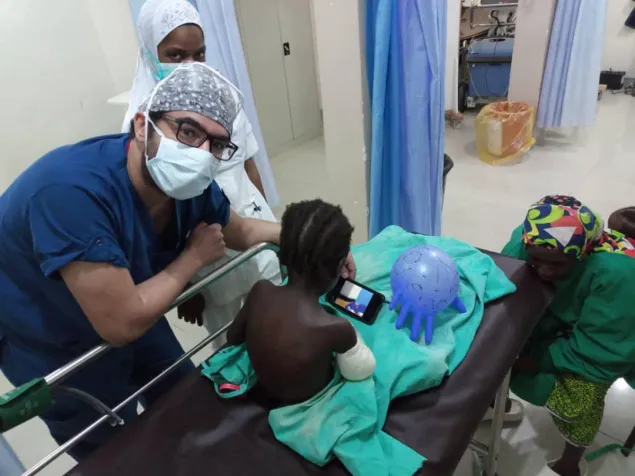
Dr. Aktham Al-Farnawani with a child with a gunshot wound to her arm before entering the operating room in Maiduguri.
But the hardest moments came during mass casualty incidents. I will never forget what happened in Maiduguri, Nigeria, when around ninety injured were brought to our hospital after an explosion. Buses and trucks arrived filled with wounded men, women, and children, crying for their lost loved ones. Blood covered the ground, the air was filled with screams, and limbs dangled from torn bodies. For a moment, I froze in place. I thought, "The world is so cruel." But there was no time to collapse.
With my team, we began the triage process: do the best for the most. This meant making the impossible decision: who can be saved and who cannot. No training prepares you for such a moment. Just as we felt we had gained some control over the chaos, another truck would arrive, loaded with new casualties. For a moment, I felt a desire to be back on the plane that had brought me there the first time. But a colleague placed his hand on my shoulder and said, "We are in this together." Those words were enough to bring life back into me.
These stories rarely make headlines. In newspapers, the news ends with a sentence: "The injured were transferred to the hospital." But for us, that is just the beginning. The injured need not only surgery but also food, water, antibiotics, dressings, physical therapy, psychological support, and most importantly, dignity. Every victim is more than just a number. Each one carries a long story of recovery, often filled with suffering, hope, and resilience.
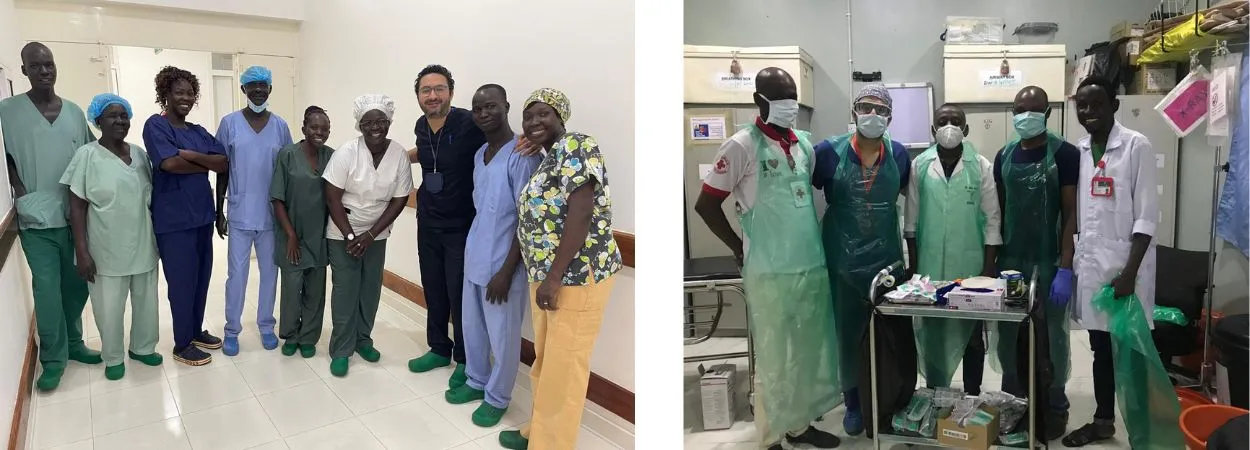
Dr. Aktham Al-Farnawani with colleagues.
At other times, those small moments with colleagues are what save us from collapse. After a long day in the operating room, we sit together for a simple meal, perhaps some rice or beans, sharing food like one family. We laugh at little things, share stories about our homelands, and try to steal minutes of human warmth amid an ocean of pain.
In those moments, I feel we are not doctors and nurses, but just humans trying to protect each other from the weight of what we see daily.
After difficult surgeries, a heavy silence often blankets the operating room. Each of us is lost in thoughts about the patient we just saved or the one we couldn’t. Sometimes, we don’t need words. Just a glance between us is enough to say, "We did our best." Then we gather our strength to enter the next procedure, as if time doesn’t give us a chance to catch our breath.
I remember one night after a long workday, I was eating with the team when the surgeon called me. A fifteen-year-old girl had arrived with a gunshot wound in her arm that had torn her blood vessels. She was at risk of losing her limb or her life if she didn’t have emergency surgery. Despite the exhaustion and hunger, we had no choice. We moved towards the hospital despite the curfew. At a military checkpoint, a soldier stopped us, looking aggressive and possibly drunk. I calmly explained that we were going to save a girl’s life. I said to him, "She is someone's daughter. Imagine if she were your daughter." After several tense moments, he allowed us to pass.
In the hospital, the girl was pale and trembling. She whispered to me, "I’m scared." I held her hand and said, "Don’t be afraid. I’m here as your father, and in the operating room, my team will be your family." She smiled faintly before the anesthesia took over. We performed life-saving surgery to stop the bleeding. Later, we learned that her parents were killed in the same attack. She and her sister were left alone. I swallowed my grief and focused on keeping her alive.
Two days later, before her second operation, she reminded me of my promise: "You said I would be your family." I smiled and assured her I would keep my promise. I passed by the physical therapy room several weeks later and saw her laughing and playing, doing exercises on her arm with our team. That bright smile, despite its fragility, meant everything to me.
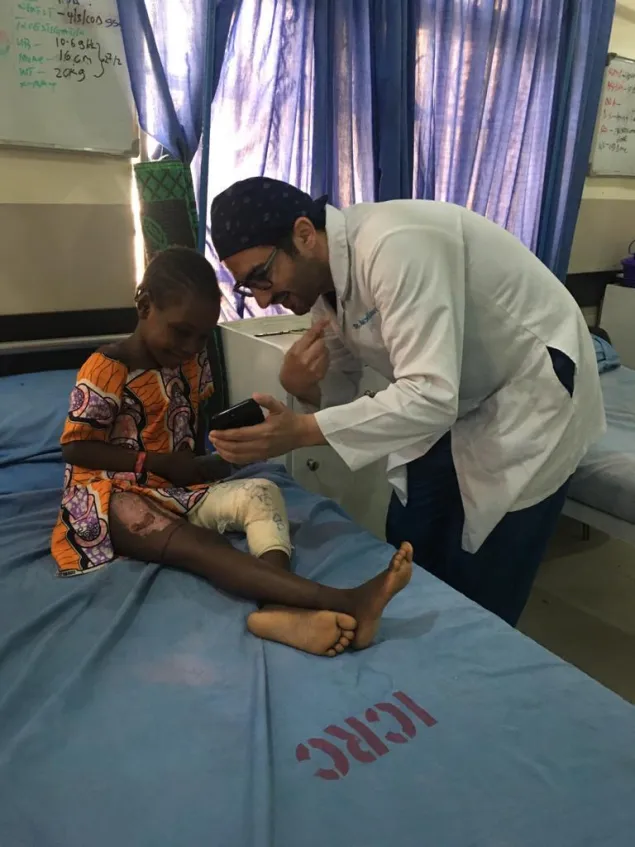
Dr. Aktham Al-Farnawani with a girl who suffered a broken thigh as a result of a gunshot in Maiduguri.
Despite the harsh reality of life during conflict, laughter has its place. One day, while we were overwhelmed with work pressure, one of the nurses cracked a joke that made us laugh from our hearts for several minutes. It may have seemed simple, but it was like medicine. This kind of humor not only lightens our load but also reaches our patients. How many times have I seen a patient smile when we exchange a simple joke in their local language? That smile amidst pain is a small miracle in itself.
Every time I leave home and sit on a plane heading to a new mission, I fight back tears and often fail. I miss my family dearly. The sacrifices are heavy, but the purpose carries me forward.
As an anesthesiologist working in the humanitarian field, my days are filled with exhaustion, uncertainty, and moments of despair. But they are also filled with resilience, gratitude, and small victories. With every limb saved, every smile restored, and every life pulled back from the brink, I remember the reason I chose this path. If given the chance, I would choose the same path every time.
Learn more about our work in South Sudan and Nigeria
- South Sudan: ICRC medical teams perform over 1,000 surgeries on weapon-wounded patients as armed conflict and violence escalate
- South Sudan: ICRC Mobile Surgical Team carries out over 300 surgeries on war wounded injured in the Sudan conflict in Renk town
- South Sudan: January to June 2025 Facts & Figures
- Crisis in Nigeria: How to Train a War Surgeon


